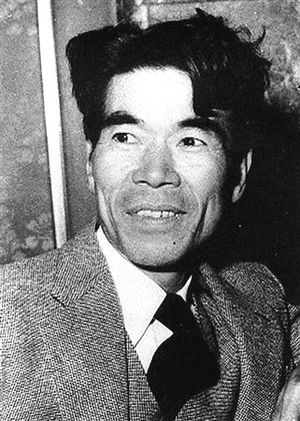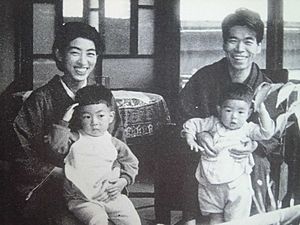Eiji Yoshikawa facts for kids
Quick facts for kids
Eiji Yoshikawa
吉川 英治 |
|
|---|---|
 |
|
| Born | Hidetsugu Yoshikawa 吉川英次 August 11, 1892 Kanagawa Prefecture, Japan |
| Died | September 7, 1962 (aged 70) Tokyo, Japan |
| Occupation | Writer |
| Nationality | Japanese |
| Citizenship | Japanese |
| Genre | Historical drama |
| Subject | Japan History |
| Notable works | Miyamoto Musashi |
| Spouse |
Yasu Akazawa
(m. 1923)Fumiko Ikedo
(m. 1937) |
|
|
|
Eiji Yoshikawa (吉川 英治, Yoshikawa Eiji, August 11, 1892 – September 7, 1962) was a famous Japanese writer. He was known for writing historical novels. He often took old Japanese stories and retold them in a way that was easier for people to read.
For example, he took a very long story called Taiko (which was 15 books long!) and made it into just two books. His books helped many people become interested in Japan's history again.
Eiji Yoshikawa won many important awards for his writing. These included the Cultural Order of Merit in 1960. This is the highest award a writer can get in Japan. He also received the Order of the Sacred Treasure and the Mainichi Art Award. He passed away in 1962. Many people consider him one of Japan's best historical novelists.
Life of Eiji Yoshikawa
Eiji Yoshikawa was born Hidetsugu Yoshikawa in Kanagawa Prefecture, Japan. This area is now part of Yokohama. When he was 11 years old, he had to leave primary school. This was because his father's business failed. He started working to help his family.
At 18, he had a serious accident while working at the Yokohama docks. After this, he moved to Tokyo. He became an apprentice in a workshop that made gold lacquer items. Around this time, he became interested in writing funny Japanese poems called comic haiku. He joined a poetry group and started writing under the pen name "Kijiro".
In 1914, he won first prize in a writing contest. His story was called The Tale of Enoshima. A publisher named Kodansha sponsored the contest. In 1921, he joined the newspaper Maiyu Shimbun. The next year, he started publishing stories in parts, like a series. His first series was Life of Shinran.
He married Yasu Akazawa in 1923. This was the same year as the Great Kantō earthquake. His experiences during the earthquake made him even more determined to become a full-time writer. In the years that followed, he published many stories. These appeared in different magazines and newspapers from Kodansha. They saw him as their best writer.
He used 19 different pen names before he decided on Eiji Yoshikawa. He first used this name for his story Sword Trouble, Woman Trouble. He became very famous after his story Secret Record of Naruto was published in the Osaka Mainichi Shimbun. From then on, his writing became much more popular.
In the early 1930s, his writing became more thoughtful. This reflected some personal challenges he was facing. But in 1935, he started publishing Musashi. This story was about the famous Japanese swordsman Miyamoto Musashi. It was published in the Asahi Shimbun newspaper. After this, his writing became known for historical adventure stories.
When the war with China started in 1937, the Asahi Shimbun sent him as a special reporter. During this time, he married Fumiko Ikedo. He continued writing novels during the war. He became more interested in Chinese culture. Some of his works from this period include Taiko and his retelling of the Romance of the Three Kingdoms.
After the war ended, he stopped writing for a while. He wanted to enjoy a quiet life in Yoshino, near Tokyo. But by 1947, he started writing again. His books after the war include New Tale of the Heike (published in 1950) and A Private Record of the Pacific War (1958).
Eiji Yoshikawa passed away on September 7, 1962, due to complications from cancer.
English Translations of Eiji Yoshikawa's Books
Four of Eiji Yoshikawa's books have been translated into English. This means people who speak English can read his amazing stories.
- Miyamoto Musashi, translated as Musashi
* This book was translated by Charles S. Terry.
- Taiko ki, translated as Taiko: An Epic Novel of War and Glory in Feudal Japan
* This book was translated by William Scott Wilson.
- Shin Heike monogatari, translated as The Heike Story: A Modern Translation of the Classic Tale of Love and War
* This book was translated by Fuki Wooyenaka Uramatsu.
- Wasurenokori no ki, translated as Fragments of a Past: A Memoir
* This book was translated by Edwin McClellan.
See also
 In Spanish: Eiji Yoshikawa para niños
In Spanish: Eiji Yoshikawa para niños
 | Charles R. Drew |
 | Benjamin Banneker |
 | Jane C. Wright |
 | Roger Arliner Young |


